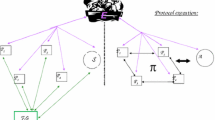Abstract
Proxy signature is a useful cryptographic primitive that allows signing right delegation. In a proxy signature scheme, an original signer can delegate his/her signing right to a proxy signer (or a group of proxy signers) who can then sign documents on behalf of the original signer. In this paper, we investigate the problem of proxy signature with revocation. The revocation of delegated signing right is necessary for a proxy signature scheme when the proxy signer’s key is compromised and/or any misuse of the delegated right is noticed. Although a proxy signature scheme usually specifies a delegation time period, it may happen that the original signer wants to terminate the delegation before it is expired. In order to solve this problem, in this paper we propose a new proxy signature scheme with revocation. Our scheme utilises and combines the techniques in the Naor-Naor-Lotspiech (NNL) framework for broadcast encryption, the Boneh-Boyen-Goh (BBG) hierarchical identity-based encryption and the Boneh-Lynn-Shacham (BLS) short signature scheme and thereby constructing an efficient tree-based revocation mechanism. The unrevoked proxy signer only needs to generate evidences for proving that he/she is a valid proxy signer once in per revocation epoch, and the verifier does not need a revocation list in order to verify the validity of a proxy signature.
Access this chapter
Tax calculation will be finalised at checkout
Purchases are for personal use only
Similar content being viewed by others
Notes
- 1.
In all the security models, we assume that there is only one set of revoked signers \(\mathcal {R}_{t_i}\) for each revocation epoch \(t_i\).
- 2.
For achieving the backward security [1], we needs the time stamp server to generate the time certificate for each proxy signature.
References
Ateniese, G., Song, D., Tsudik, G.: Quasi-efficient revocation of group signatures. In: Blaze, M. (ed.) FC 2002. LNCS, vol. 2357, pp. 183–197. Springer, Heidelberg (2003)
Boneh, D., Boyen, X., Goh, E.-J.: Hierarchical identity based encryption with constant size ciphertext. In: Cramer, R. (ed.) EUROCRYPT 2005. LNCS, vol. 3494, pp. 440–456. Springer, Heidelberg (2005)
Boneh, D., Lynn, B., Shacham, H.: Short signatures from the weil pairing. In: Boyd, C. (ed.) ASIACRYPT 2001. LNCS, vol. 2248, pp. 514–532. Springer, Heidelberg (2001)
Das, M.L., Saxena, A., Gulati, V.P.: An efficient proxy signature scheme with revocation. Informatica 15(4), 455–464 (2004)
Dodis, Y., Fazio, N.: Public key broadcast encryption for stateless receivers. In: Feigenbaum, J. (ed.) DRM 2002. LNCS, vol. 2696, pp. 61–80. Springer, Heidelberg (2003)
Goldwasser, S., Micali, S., Rivest, R.L.: A digital signature scheme secure against adaptive chosen-message attacks. SIAM J. Comput. 17(2), 281–308 (1988)
Halevy, D., Shamir, A.: The LSD broadcast encryption scheme. In: Yung, M. (ed.) CRYPTO 2002. LNCS, vol. 2442, pp. 47–60. Springer, Heidelberg (2002)
Huang, X., Mu, Y., Susilo, W., Zhang, F., Chen, X.: A short proxy signature scheme: efficient authentication in the ubiquitous world. In: Enokido, T., Yan, L., Xiao, B., Kim, D.Y., Dai, Y.-S., Yang, L.T. (eds.) EUC-WS 2005. LNCS, vol. 3823, pp. 480–489. Springer, Heidelberg (2005)
Huang, X., Susilo, W., Mu, Y., Wu, W.: Proxy signature without random oracles. In: Cao, J., Stojmenovic, I., Jia, X., Das, S.K. (eds.) MSN 2006. LNCS, vol. 4325, pp. 473–484. Springer, Heidelberg (2006)
Kim, S., Park, S., Won, D.: Proxy signatures, revisited. In: Information and Communications Security, pp. 223–232 (1997)
Lee, B., Kim, H.-S., Kim, K.: Secure mobile agent using strong non-designated proxy signature. In: Varadharajan, V., Mu, Y. (eds.) ACISP 2001. LNCS, vol. 2119, pp. 474–486. Springer, Heidelberg (2001)
Lee, B., Kim, H., Kim, K.: Strong proxy signature and its applications. In: Proceedings of SCIS, vol. 1, pp. 603–608 (2001)
Li, X., Chen, K., Li, S.: Multi-proxy signature and proxy multi-signature schemes from bilinear pairings. In: Liew, K.-M., Shen, H., See, S., Cai, W. (eds.) PDCAT 2004. LNCS, vol. 3320, pp. 591–595. Springer, Heidelberg (2004)
Liu, Z., Yupu, H., Zhang, X., Ma, H.: Provably secure multi-proxy signature scheme with revocation in the standard model. Comput. Commun. 34(3), 494–501 (2011)
Lu, E.J.-L., Hwang, M.-S., Huang, C.-J.: A new proxy signature scheme with revocation. Appl. Math. Comput. 161(3), 799–806 (2005)
Mambo, M., Usuda, K., Okamoto, E.: Proxy signatures: delegation of the power to sign messages. IEICE Trans. Fundam. Electron. Commun. Comput. Sci. 79(9), 1338–1354 (1996)
Mambo, M., Usuda, K., Okamoto, E.: Proxy signatures for delegating signing operation. In: Proceedings of the 3rd ACM Conference on Computer and Communications Security, pp. 48–57. ACM (1996)
Naor, D., Naor, M., Lotspiech, J.: Revocation and tracing schemes for stateless receivers. In: Kilian, J. (ed.) CRYPTO 2001. LNCS, vol. 2139, pp. 41–62. Springer, Heidelberg (2001)
Seo, S.-H., Shim, K.-A., Lee, S.-H.: A mediated proxy signature scheme with fast revocation for electronic transactions. In: Katsikas, S.K., López, J., Pernul, G. (eds.) TrustBus 2005. LNCS, vol. 3592, pp. 216–225. Springer, Heidelberg (2005)
Sun, H.-M.: Design of time-stamped proxy signatures with traceable receivers. In: IEE Proceedings-Computers and Digital Techniques, vol. 147, no. 6, pp. 462–466 (2000)
Tzeng, S.-F., Yang, C.-Y., Hwang, M.-S.: A nonrepudiable threshold multi-proxy multi-signature scheme with shared verification. Future Gener. Comput. Syst. 20(5), 887–893 (2004)
Yi, L., Bai, G., Xiao, G.: Proxy multi-signature scheme: a new type of proxy signature scheme. Electron. Lett. 36(6), 527–528 (2000)
Acknowledgement
The last author of this work is supported by the National Natural Science Foundation of China (No. 61402184).
Author information
Authors and Affiliations
Corresponding author
Editor information
Editors and Affiliations
Rights and permissions
Copyright information
© 2016 Springer International Publishing Switzerland
About this paper
Cite this paper
Xu, S., Yang, G., Mu, Y., Ma, S. (2016). Proxy Signature with Revocation. In: Liu, J., Steinfeld, R. (eds) Information Security and Privacy. ACISP 2016. Lecture Notes in Computer Science(), vol 9723. Springer, Cham. https://doi.org/10.1007/978-3-319-40367-0_2
Download citation
DOI: https://doi.org/10.1007/978-3-319-40367-0_2
Published:
Publisher Name: Springer, Cham
Print ISBN: 978-3-319-40366-3
Online ISBN: 978-3-319-40367-0
eBook Packages: Computer ScienceComputer Science (R0)




